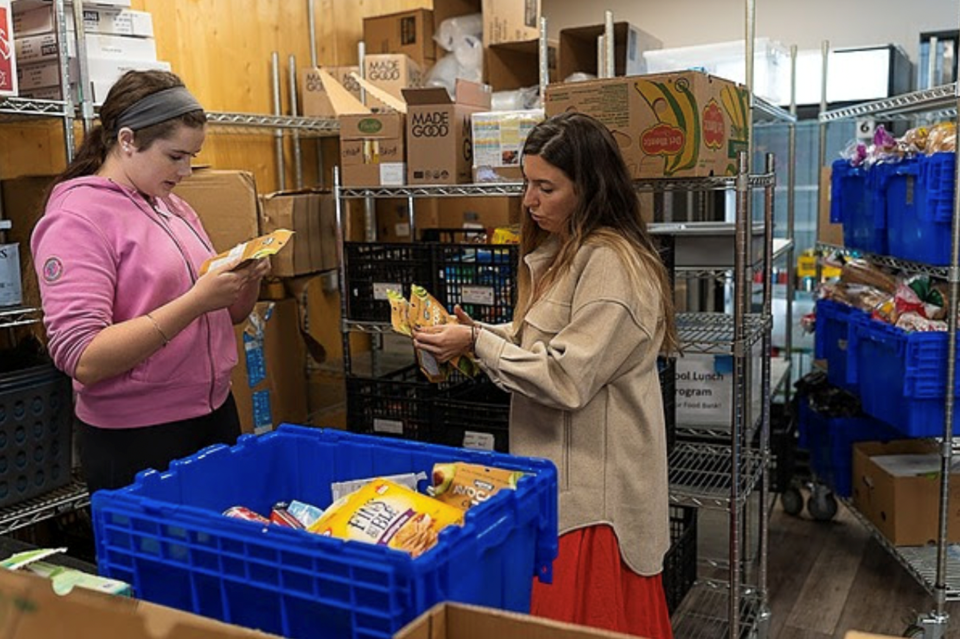There’s no question the pandemic impacted every corner of the resort, but one could argue no organization or business continues to carry a heavier load than the Whistler Community Services Society (WCSS).
Between the non-profit’s Food Bank, Re-Use-It and Re-Build-It Centres, and outreach programming, “COVID-19 placed extraordinary strain on our organization,” explained WCSS executive director Jackie Dickinson. “We became the centre for support for people facing mental-health challenges, food insecurity, and financial instability.”
Today, demand for WCSS’ services remains five times higher than pre-pandemic levels, Dickinson added.
“With the declining availability of affordable housing, increases in cost of living, and unexpected personal debt loads, WCSS is expecting demand to stay high into the foreseeable future,” she said.
The good news? WCSS is among a handful of Whistler non-profits receiving an influx of funding this August, intended to help the local organizations streamline internal operations and continue meeting that sky-high demand.
In a release on Thursday, Aug. 17, the Whistler Community Foundation (WCF) announced it is delivering a total of $161,000 to fund seven local projects this year.
The sum comes courtesy of the Government of Canada’s Community Services Recovery Fund, a one-time, $400-million, post-COVID investment to help organizations like charities, non-profits, and Indigenous governing bodies “adapt, modernize, and be better equipped to improve the efficacy, accessibility and sustainability of the community services that they provide through the pandemic recovery and beyond,” WCF explained in the release.
In other words, the federal funding helps pay for projects that may not grab headlines, but will nonetheless enable recipients to serve Whistler’s community even more effectively than they already do.
It’s a unique funding opportunity WCF “is quite excited about,” said CEO Claire Mozes. “Operational funds that support the development of or transition to stronger systems are game changers in terms of efficiency and efficacy of the demanding and necessary work Whistler charities and non-profits do,” she explained.
WCSS earned the biggest grant in the bunch, receiving $47,000 to pay for a much-needed technology systems upgrade in 2023.
“Receiving an investment through the Community Services Recovery Fund gives us the ability to upgrade our technical offerings, support, and infrastructure which are essential in providing sustainable, efficient support in the years to come,” Dickinson explained.
An investment of $28,987 will help the Whistler Multicultural Society implement its “Digital Connections” plan, which will see the local organization lean on “knowledge, connections, and technology for improved accountability.” The Whistler Adaptive Sports Program Society, meanwhile, receives $24,333 to “revise and re-energize” its operations heading into winter.
On the heels of a recent five-figure grant from the federal government’s New Horizons for Seniors Program, the Whistler Mature Action Community is celebrating an additional $22,965 investment to fund its development of a website and customer relationship management system.
Other funding recipients include the Zero Ceiling Society of Canada, which will use a $16,000 grant to modernize its human resources, IT, and finance systems; the Whistler Writing Society, whose development of a fundraising strategy and accounting transition gets an $11,685 boost; and lastly, the Whistler Gymnastics Club, which receives $10,030 to modernize its accounting and human resources management systems.
As WCF noted, organizations like the seven listed above serve on the front lines when it comes to addressing Whistler’s needs. Since the earliest days of the pandemic, local non-profits have struggled to balance rising demand for their services with lower revenues, fewer donations due to the higher-than-ever cost of living, plus a growing obligation to integrate digital tools into their programming.
“Community service organizations are at the heart of communities like Whistler, creating a sense of belonging from coast to coast to coast. The Community Services Recovery Fund will enable organizations that serve our diverse communities to adapt and modernize their programs and services and to invest in the future of their organizations, staff and volunteers,” said Canada’s Minister of Families, Children and Social Development Jenna Sudds in the release.
“Together, we can rebuild from the isolation of the COVID-19 pandemic and build a more just and equitable future for those in Whistler.”




